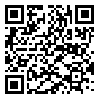1- Shahid Beheshti University, Tehran
2- Shahid Beheshti University, Tehran ,b-abdoli@sbu.ac.ir
3- , Universidade Federal de Santa Maria (Santa Maria, Brazil).
2- Shahid Beheshti University, Tehran ,
3- , Universidade Federal de Santa Maria (Santa Maria, Brazil).
Abstract: (5977 Views)
The present study aims to investigate the variables of social networks in different positions in basketball. These variables were applied in two levels of analysis: micro (individual) and macro (global interaction of the team). 24 official Chemidoor Club competitions in the 2020 men's Iranian Premier League were selected by available sampling. This research analyzed the network properties of Degree, Betweenness, Closeness, Eigenvector, and Density centrality across teams and positions. The one-way ANOVA for the factor position in the micro-level found statistical differences between the game positions in the dependent variables of Dc: (F(4,15)= 61/29, p= 0/000), Bc: (F(4,15)= 210/11, p= 0/000), Cc: (F(4,15)= 78/55, p= 0/000). However, no significant difference was observed in the Eig: (F (4, 15) = 1/58, p= 0/184). Results of post hoc test indices were significantly different between position 1 (point guard) and other positions. Macro-level team density analysis showed a significant difference between performance results in successful and unsuccessful. The guard player role was observed as the situation that establishes the most interactions with teammates during the competition. Therefore, players with higher degrees were not the ones assisting the most shots. The other players with higher degrees were not the ones assisting the most shots. These results may be used as a tool for coaching to improve their teams’ strategies in concrete, measurable ways.
Type of Study: Research |
Subject:
motor behavior
Received: 2022/11/16 | Accepted: 2023/05/10 | ePublished ahead of print: 2023/05/10
Received: 2022/11/16 | Accepted: 2023/05/10 | ePublished ahead of print: 2023/05/10
Send email to the article author
| Rights and permissions | |
 | This work is licensed under a Creative Commons Attribution-NonCommercial 4.0 International License. |






